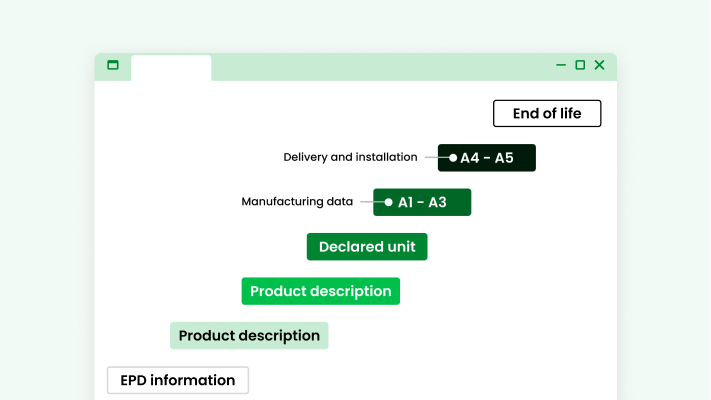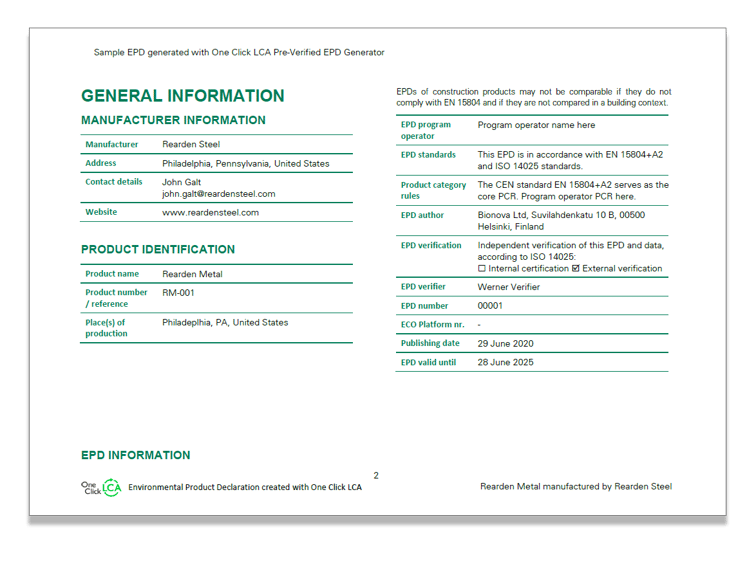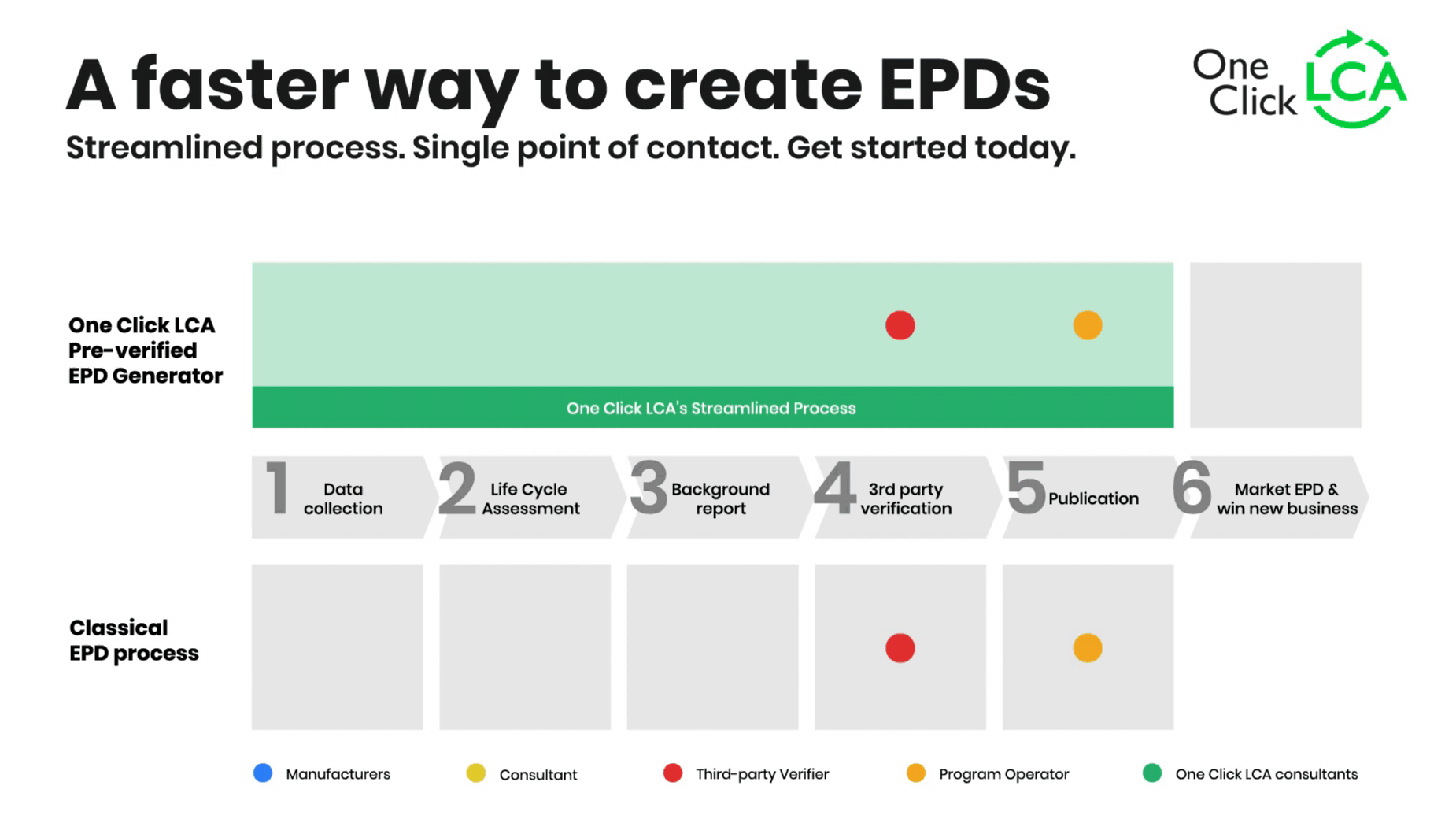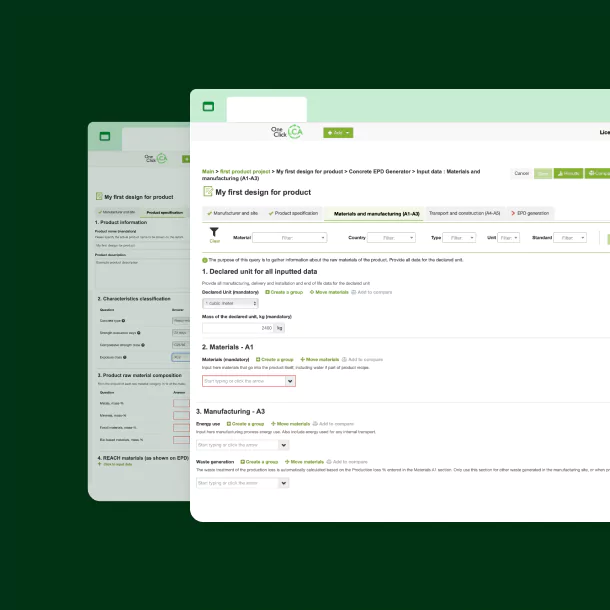
Image: Process of creating EPDs
Every Environmental Product Declaration (EPD) needs to be verified by an independent third party before it can be published. This ensures the accuracy and reliability of the EPD and that it conforms to the requirements of the relevant Product Category Rules (PCR). For a comprehensive overview of how to develop an EPD, read our How to create an EPD ebook.

However, the verification process can be slow, frustrating, and even nerve-wracking, as companies potentially face long rounds of reviews and amendments until the verifier is satisfied that the process, data, and documentation comply with the relevant EPD standards and PCR. Significant time, money, and effort can be saved by using a pre-verified EPD tool, like One Click LCA EPD Generator.
Does EPD pre-verification mean you can sidestep verification?
No. Pre-verification streamlines the process, but the resulting EPD will still need to be approved by a third party. Even if bypassing verification were possible, it would not be desirable as it would undermine an EPD’s status as objective, reliable, and transparent.
However, the process is significantly quicker as the verifier does not need to verify the data produced by the tool. Her time, instead, is focused on ensuring that the inputted data is right for the LCA model being used and the relevant PCR.
Why is third-party verification important?
Third-party verification is a key factor in why EPDs are valued for their impartial, standardized, and comparable information. It is a core element of the international standard which defines EPDs, ISO 14025. Without third-party verification, your EPD will not be recognized by many certification schemes, regulations and procurement requirements.
As the demand for EPD grows, there has been an accompanying rise in companies offering labels which are called EPDs, but without third-party verification. Buyer beware. Bypassing this step may seem attractive in the short-term, but in the long run, could render your EPD investment effectively useless.
How does EPD pre-verification work?
Pre-verification means that the pre-verified EPD tools themselves have been independently verified to ensure they have the right data sets and calculation models for a specific PCR. The One Click LCA Pre-verified EPD Generator has been approved by the Finnish EPD program operator RTS. Once a tool is approved for pre-verification in this way, the data it generates for the relevant PCR is not subject to further verification.
Pre-verified EPD tools are like a very well tested cake factory. Its processes and ingredients (LCA methodology and data sources) have been rigorously tested and independently approved to ensure that its results comply with the precise standards set out in the recipe book (PCR).
But, before any resulting cake is sent to market, the Quality Assurance team (Verifier) still needs to ensure that no one has mistakenly added salt instead of sugar or produced fruit cakes when the client requested brownies. In other words, the quality of inputted data will be checked along with any limitations or assumptions that have been made.
In a traditional EPD process, not only is the inputted data assessed at verification stage, but also the LCA approach which has been implemented, the calculations made and the quality and reliability of the data points. Or to go back to the cake factory analogy, the verifier needs to inspect the entire production line and examine the quality of the ingredients to see whether it’s all set up to make high quality baked goods.
| Pre-verified information | Third-party verified information |
|
Data sources Core LCA model Calculations made by the tool |
Inputted product data Limitations and assumptions of LCA |
Summary of pre-verified and third-party verified information
How does EPD pre-verification affect the creation process?
To understand how pre-verification speeds things up, it’s useful to look at how EPDs are created. There are five core steps to creating an EPD.
- Collect product data – covering raw materials, manufacturing, transport etc.
- Conduct a life cycle assessment (LCA).
- Write a background report.
- Submit the background report and LCA results (in EPD format) for verification.
- Register and publish your EPD with the program operator.
In the traditional EPD creation process, many of these stages involve liaising with a number of different third parties: an LCA consultant, Third Party Verifier and Program Operator.

One Click LCA Pre-verified EPD Generator simplifies this process dramatically. Rather than dealing with lots of third parties, One Click LCA is your only point of contact, which makes things much simpler. And, as a manufacturer, your work within the process has been reduced to three steps. Let’s look at them now.
- Collect the relevant data – aided by custom templates and user-friendly tools. We guide you on what data you need to collect and when you’ll need it.
- Conduct a life cycle assessment (LCA) – this is automated by our software, you just need to adjust the data.
- Write a background report. We provide report templates that meet the reporting requirements of your PCR. You just need to edit certain fields with the specifics of your product and add relevant details such as images and logos. In addition, we can internally review your report to minimise errors and reduce verification time.
And that’s it. Everything else is managed by One Click LCA.
Pre-verification takes much of the heavy lifting out of EPD creation. The One Click LCA Pre-verified EPD Generator reduces a complex operation involving multiple consultants, tools and databases to a seamless process with one point-of-contact and plenty of support.
One Click LCA Pre-verified EPD Generator has been approved for all the main construction product categories, including:
- Cementitious Products: ready-mix concrete, pre-cast concrete, concrete products and cementitious mortars and screeds.
- Plumbing Products: plumbing products, equipment, components and systems.
- Wood & Plant Fiber based Products: wood, wood-based boards and elements, including composites.
- Primary Steel and Aluminum and all Metal-Based Products.
- Paints, Coatings, Sealants and Adhesives.
Read the full list of product categories supported by One Click LCA Pre-verified EPD Generator here.
If you need a solution for a category that is not yet listed please get in touch with our experts.


